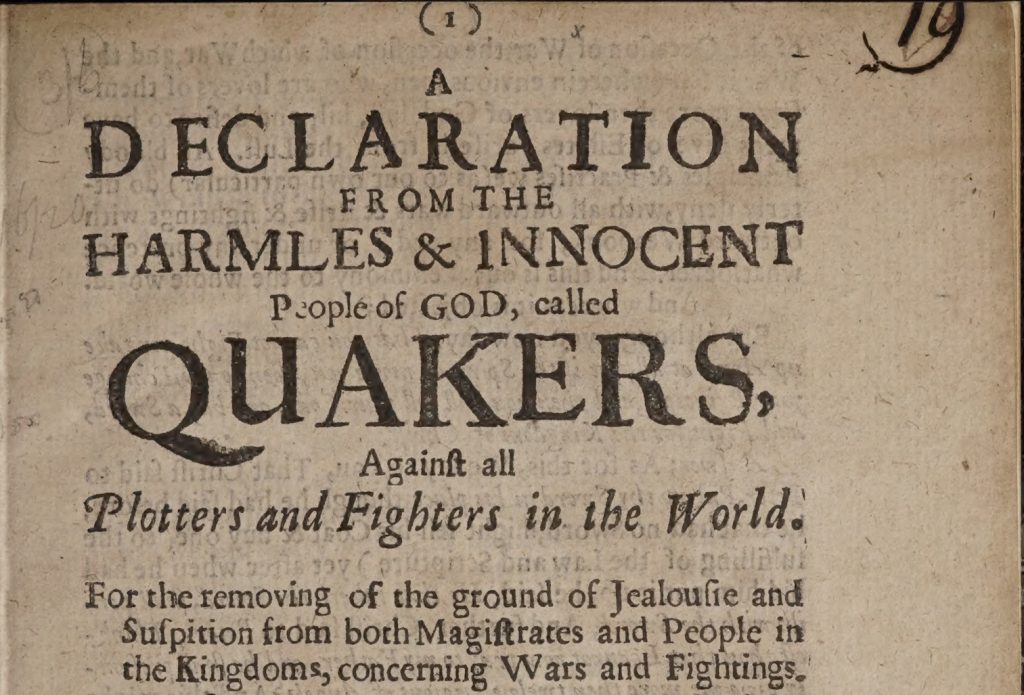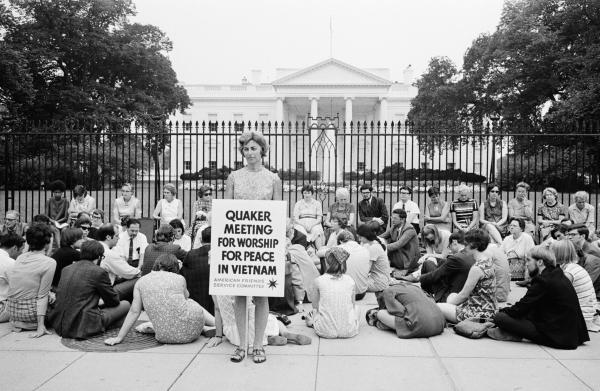Faith and Practice of Quakers in Britain says that the Peace Testimony is probably the best known and best loved of the Quaker testimonies. It includes corporate testimony and personal witness, conscientious objection to compulsory military service and taxation for military purposes, pacifist stand; its practical expressions are public protest, relief of suffering, reconciliation and mediation, disarmament, building the institutions of peace and social justice, right sharing of the world’s resources, as well as understanding the personal roots of conflict and education for peace.
Being asked to became a captain of army during a war, a founder of Quaker faith George Fox preferred imprisonment and wrote in his Journal in 1651: “I told them I lived in the virtue of that life and power that took away the occasion of all wars and I knew from whence all wars did rise, from the lust, according to James’s doctrine… I told them I was come into the covenant of peace which was before wars and strifes were.”
In 1660, twelve Quakers submitted to the head of state a peace testimony entitled “A Declaration from the harmless and innocent people of God, called Quakers, against all plotters and fighters in the world, for the removing the ground of jealousy and suspicion from both magistrates and people in the kingdom, concerning wars and fightings.”

The 1660 Peace Testimony (Declaration) says:
Our principle is, and our Practice have always been, to seek peace and ensue it and to follow after righteousness and the knowledge of God, seeking the good and welfare and doing that which tends to the peace of all. We know that wars and fightings proceed from the lusts of men (as James 4:1-3), out of which lusts the Lord hath redeemed us, and so out of the occasion of war. The occasion of which war, and war itself (wherein envious men, who are lovers of themselves more than lovers of God, lust, kill, and desire to have men’s lives or estates) ariseth from the lust. All bloody principles and practices, we, as to our own particulars, do utterly deny, with all outward wars and strife and fightings with outward weapons, for any end or under any pretence whatsoever. And this is our testimony to the whole world.
That the spirit of Christ, by which we are guided, is not changeable, so as once to command us from a thing as evil and again to move unto it; and we do certainly know, and so testify to the world, that the spirit of Christ, which leads us into all Truth, will never move us to fight and war against any man with outward weapons, neither for the kingdom of Christ, nor for the kingdoms of this world.
And as for the kingdoms of this world, we cannot covet them, much less can we fight for them, but we do earnestly desire and wait, that by the word of God’s power and its effectual operation in the hearts of men the kingdoms of this world may become the kingdoms of the Lord and of his Christ, that he might rule and reign in men by his spirit and truth, that thereby all people, out of all different judgments and professions might be brought into love and unity with God and one with another, and that they might all come to witness the prophet’s words, who said, ‘Nation shall not lift up sword against nation, neither shall they learn war any more’. (Isaiah 2:4; Micah 4:3)
For we know, as the Lord hath kept us innocent, so he will plead our cause, when there is none in the earth to plead it. So we, in obedience to his truth, do not love our lives unto the death, that we may do his will, and wrong no man in our generation, but seek the good and peace of all men. And he that hath commanded us that we shall not swear at all (Matthew 5:34), hath also commanded us that we shall not kill (Matthew 5:21), so that we can neither kill men, nor swear for or against them.

